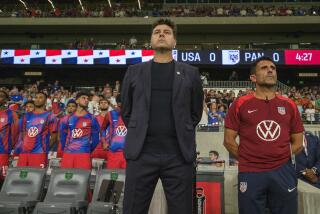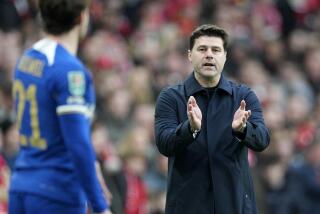Arena Takes Blame, Then Dishes It Out
HAMBURG, Germany — This is when Bruce Arena benefits from coaching in a nation that doesn’t follow soccer with the same zeal it reserves for, say, the Dow Jones industrial average.
If the coach of any soccer-crazy country lost its World Cup opener 3-0 the way the United States did to the Czech Republic on Monday, armed men would board the team bus, demand his passport and ban him from returning home. England Coach Sven-Goran Eriksson has been hammered for his choices in the first game against Paraguay, and his team won.
Perhaps it was a lack of fear of retribution that led Arena, when asked Tuesday which of the first game’s errors were his, to say: “All of them. You can check all the boxes, you can blame it all on me. I accept that. Players play a little bit of a role too, but I’m willing to take the big hit on that one.”
Then again, he also said: “If I had to do it over again, I’m not sure there’s a whole lot that I would change.”
And earlier he said: “The reason we lost the game was their players played better than our players. Individually they were better, won most of the matchups on the field. At the end of the day, it is about that.”
There also was this: “We weren’t attacking, we weren’t dangerous enough. Our set pieces were poorly executed. Technically, probably it was the worst I’ve seen our team play in a long time. We didn’t pass well. We weren’t good at serving crosses. So it all adds up.”
And the accumulated weight usually falls back on the players. As it should.
While Arena said “it is very rare” for him to single out individual players for blame, after the game Monday he did say, “Landon [Donovan] showed no aggressiveness tonight. We got nothing from [DaMarcus] Beasley on the night.”
The U.S. plays its next match Saturday against an even stronger team, Italy, and probably must win it to have a chance to advance to the next round.
At his news conference Tuesday, Arena didn’t back down about his team’s disappointing play.
On Beasley, he said: “If he’s any kind of a player and a man, he understands that. If he doesn’t, then he’s not going to be able to help us in Games 2 or 3, either.”
Donovan had said that the way the U.S. team played didn’t allow him to be effective.
“I didn’t get the ball in good enough places,” Donovan said. “The second half I found it in a little better places and we got some good opportunities out of it. But I need to get the ball in better spots. If we’re going to concede that we’re just going to move the ball uphill, that’s not playing into my strength.”
Arena said it should be up to Donovan to take the initiative.
“Landon could have played better, he knows he could have played better,” Arena said. “Landon’s lack of aggressiveness in the attack, his running off the ball, his desire to make plays and be part of the game was not on [Monday] night. He knows that and I’m sure he’ll pick it up on Saturday” against Italy.
Donovan used the word “disjointed” to describe the team’s play in the first game, and that also seems an apt description when it comes to the U.S. team and its coach’s views of what went wrong. Beasley questioned the halftime alignment switch.
It seems that if there are any dramatic lineup changes to come, they will involve Beasley. Eddie Johnson, who played well after starting the second half Monday, is a nominee for a larger role Saturday.
Arena wasn’t divulging what moves he’ll make.
“We’ll make some changes,” Arena said. “I don’t need to say that 11 is the one we should go again with. It’s obvious we need to make a couple of changes.”
The one thing he can confirm: “We’re not going to go with the 3-0 loss game plan.”
Arena showed he still had a sense of humor. He didn’t lash back whenever a finger pointed in his direction. He wasn’t malicious, just matter-of-fact, almost as emotionally detached as an accountant preparing a tax return.
He said he’d watched tape of the game twice, plus the first half of the Italy-Ghana match to get an initial look at the next opponent.
And while he’s remiss to discuss injuries (including Eddie Pope’s hand injury), he did provide this prognosis of the U.S. team’s status: “Slightly damaged. I wouldn’t say severely. We’re not in a coma yet.”
J.A. Adande can be reached at j.a.adande@latimes.com. To read more by Adande, go to latimes.com/Adandeblog.







